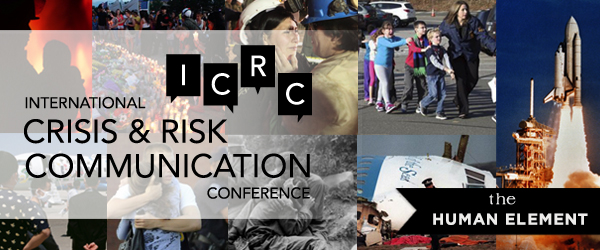ICRC 2014 – The Human Element – Firestorm to Present
The 2014 International Crisis & Risk Communication (ICRC) Conference theme is The Human Element.
Firestorm attended, presented, and learned a great deal from past ICRC Conferences. We hope to see you in March for ICRC 2014!
Firestorm President Jim Satterfield and Firestorm EVP of Social Media Karen Masullo, will each present high-energy, interactive sessions at this year’s ICRC conference hosted by the Nicholson School of Communication, UCF Orlando. Join us!
The theme for the 2014 ICRC Conference calls our attention to the human factors that can cause crises, help mitigate incidents, create and manage communication before, during and after events. It also looks at the wide range of “audience variables” that affect comprehension, understanding and behavioral response to crisis and risk communication. Leading researchers and experienced professionals will address the best methods for managing a crisis. The ICRC Conference will benefit novices to seasoned veterans working in the areas of crisis and risk communication as it delves into the human and emotional sides of a crisis.
The conference welcomes submissions of case study oriented presentations, especially those related to The Human Element and crisis and risk communication.
The ICRC Conference was designed to facilitate interaction and discussion about crisis and risk communication among members of both the professional and academic research communities.
The concept for an international crisis and risk communication conference was created by the conference convener, Dr. Robert C. Chandler, and his work in crisis and risk communication applied research. It became apparent that research scholars tended to “talk with” and interact predominately with other research scholars at academic conferences and meetings. Likewise, professionals seemed to be sharing with other professionals in a variety of conventions, expos and trade shows driven by vendor sales. There was a need for expanded idea sharing and conversations to create a new synergy that engaged the perspectives of both practitioners and academics.
Further recognizing that issues surrounding crisis and risk communication are not limited by national boundaries, it seemed that connecting international professionals and research scholars was key to enriching the conversation. The goal to create a “place and space” where a global audience of professionals and academics could comfortably gather was the motivation to convene the annual international crisis and risk communication conference.
The vision for the annual ICRC Conference remains consistent with its origin. The priorities remain to keep the conference as a conversational forum, to sustain a climate for personal interaction, to feature leading professionals and top scholars, and to provide information and new ideas that are useful and meaningful to conference participants.
Reasons to Attend
- Professional Development: Learn about the latest research findings in crisis and risk communication.
- Solutions: Discover best practices for implementing a crisis management plan and managing a crisis.
- Network: Connect with the world’s leading communication researchers, academics and practitioners in an energized learning environment.
- Practical: Gain valuable peer relationships and attain applicable practices that can be implemented immediately.
What people are saying…
“This was an extremely useful conference. The number of attendees allowed for meaningful interaction even in larger presentation sessions.”
“There were a lot of experienced attendees so the discussions inside and outside the sessions were very beneficial.”
“It was very nice to have my first experience at a conference in an environment with such friendly participants and organizers.”
“The conference was one of the best professional development values for anyone working in the field.”
“The opportunities to meet and mingle were great!”
“The event was a spectacular success with a great range and breadth of speakers. I could have flown home happy by lunch on Monday and the event just kept getting better and better.”
“I loved the open invitation for contributions from the floor.”
“I had a wonderful experience at the ICRC Conference and will be encouraging other local researchers to attend in the future. It was definitely worth the long trip!”
“This was a well-orchestrated conference. Great topics! Everything ran so smoothly. Kudos to the staff!”
ICRC Conference hosted by the Nicholson School of Communication, UCF Orlando,
Florida USA.
International Crisis and Risk Communication Conference March 3 – 6, 2014
www.icrcconference.com

 “What should we do now?” “What should we say?”
“What should we do now?” “What should we say?”